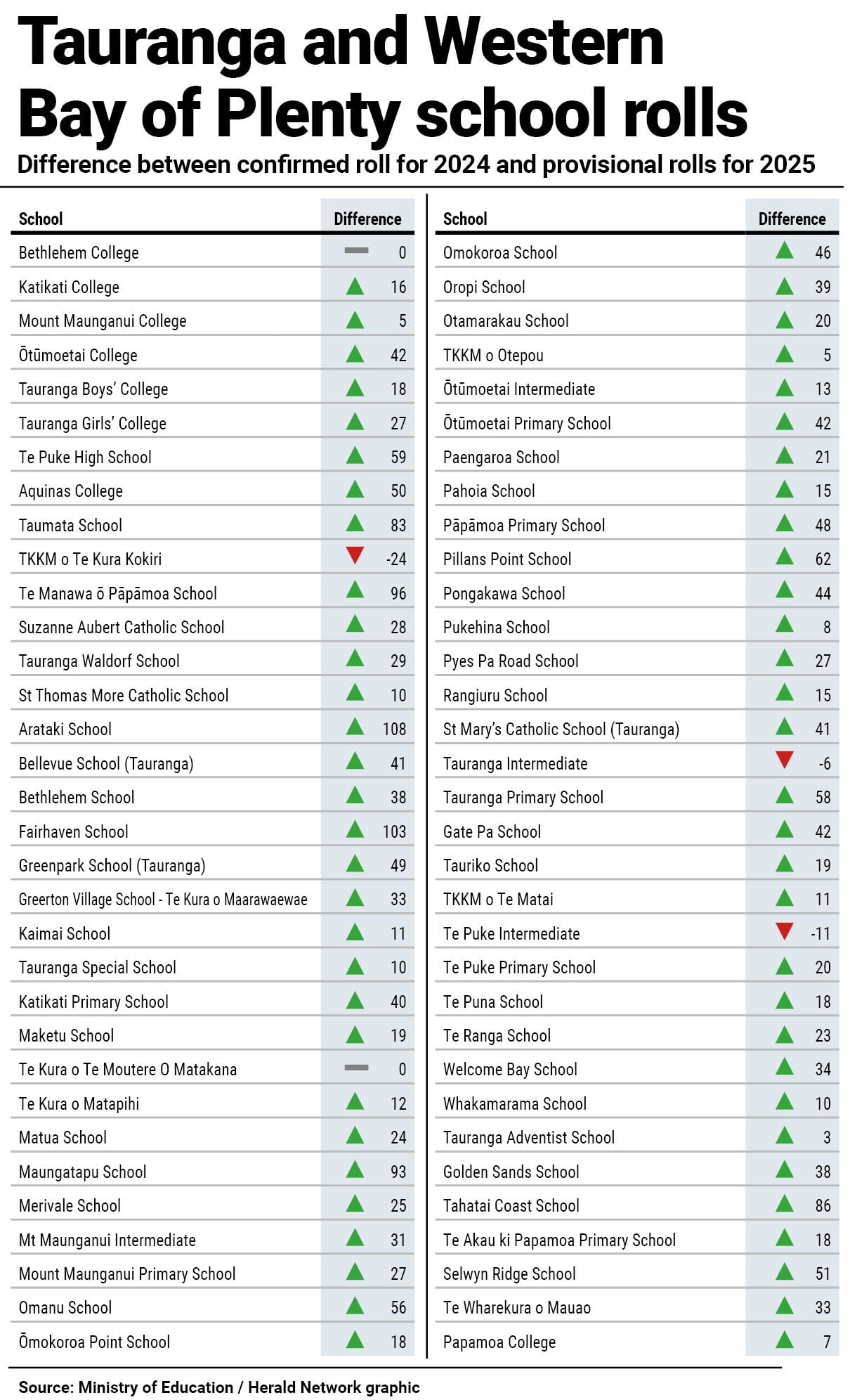Hiini told the Bay of Plenty Times the school was in a “desirable location” for real estate and many new enrolments were from families buying property in the area.
There was growth across all year levels, but the majority were new entrants, she said.
Hiini said the school also had “significant” roll growth last year which led her to declining out-of-zone enrolments last year and this year.
She said the school had “special character areas” including Rumaki (full immersion in te reo Māori), Aoraki (bilingual), and Montessori classrooms, which the school could also no longer accept out-of-zone enrolments for.
Another challenge was having to decline enrolments from families who had a “history” with the school or students with siblings at the school, because they were no longer living within the school’s zone, she said.
Hiini said the school was at “nearly maximum capacity” in regard to building space.
“That’s something that we’re managing really carefully ... depending on your numbers in your school, the ministry won’t give you more buildings if you have too many out-of-zone enrolments.”
Fairhaven School ‘over capacity’
Fairhaven School principal Paul Hunt said this year’s roll growth was a “big surprise” as it had not reached 500 students before.
The ministry’s data showed a provisional school roll of 558 students - up from 455 last year.
Hunt said the Te Puke school had been managing its roll numbers but a change in immigration settings led to “a big influx of people”.
While the school embraced diversity, this put “a lot of demands” on the school which was already “over capacity”.
He said the school had a Māori immersion unit which several out-of-zone students were enrolled in.
“We have four classes of level one Māori immersion - if we didn’t have that, we would have four classes that would be for English Medium.
“It has put a lot of pressure on our school. We’ve worked with the ministry trying to facilitate where we might have more buildings but because of the fact we have a number of out-of-zone students, we don’t qualify for any extra buildings.”
Hunt said the school needed one to two extra classrooms.
The school could not decline students who lived in zone even if the school was “full”, he said.
“It has put us in a very tricky situation.”
Change in immigration settings
Ministry of Business Innovation and Employment immigration (skills and residence) policy manager Polly Vowles said in general, there had been an increase in student visas granted to dependents of workers, which reflected the volume of migrant workers coming to New Zealand on an Accredited Employer Work Visa (AEWV) since 2022.
The Government had since made changes to immigration settings to help get net migration “back to a sustainable level” and to ensure the AEWV settings were focused on attracting and retaining the skills New Zealand needs, Vowles said.
Two changes were made in April and December. Included in these changes were limitations on the ability of lower-skilled workers to bring in partners and children unless they were on a pathway to residence, she said.
Vowles said a rise in immigration fees and levies took effect in October - “part of a move towards a ‘user-pays’ immigration system to make it more sustainable”.
This enabled Government funding for school ESOL programmes to be reduced by 80%, with costs being met by users of the immigration system instead, she said.
The Government would fund the remaining 20%. The reduction in Government funding aligned with the principle that those who receive the benefit of the immigration system should bear the cost, Vowles said.
Vowles said annual net migration had been declining from its post-Covid peak and the latest release from Stats NZ showed this decline was continuing and was now at a level comparable to historical averages.
Stats NZ had provisionally estimated annual net migration in the year ended November 2024 to be an inflow of 30,600 compared with a net migration inflow of 133,300 in the year ended November 2023, Vowles said.
Ministry of Education Te Tai Whenua (Central) hautū (deputy secretary) Jocelyn Mikaere said the ministry’s regional teams were available and worked closely with schools to give advice and support.
“I would encourage principals to make contact with our local team if they have specific matters they would like to discuss.”
Megan Wilson is a health and general news reporter for the Bay of Plenty Times and Rotorua Daily Post. She has been a journalist since 2021.



